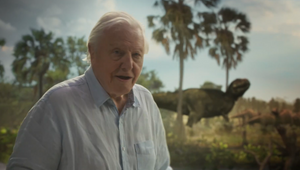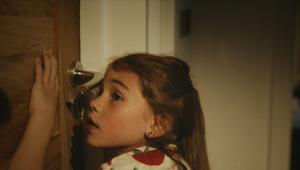
Director Jackson Lee Forsythe Likes “The Things We Hide From”

Jackson Lee Forsythe felt he simply had to start directing. The feeling, a force, was impossible to ignore. “I think I just felt like I had to do it. You get this feeling in your gut that if you don’t make something, you’ll go crazy. I feel most like myself when I’m on set. When I’m not, I start to fall apart a bit,” he says.
Represented by Academy Films, Jackson has been honing his directing skills on projects like ‘The OOO’ for Drambuie, Mahou’s ‘Plimsoll’ (which won him a Gold at the Cannes YDA in 2023), and Rema’s ‘Ozeba’ music video.
Above: Mahou, 'Plimsoll'
His latest work is for the fashion brand Salomon, with Jackson directing two gently surreal films, ‘Market’ and ‘Underwater’, featuring the Japanese ‘ama’ – female divers famous for collecting pearls and seafood. Salomon’s shoes take the place of fish in the two films, appearing on scales, waiting to be bought, and as a school of fish when the divers plunge below the water’s surface. Jackson says that the brand was amazing in giving him “a lot of space creatively” when directing.
The production process was a lesson for Jackson. “I’d actually become completely delusional and wrote a 10-page script, that’s the danger of producing your own work, I guess,” he says self-deprecatingly. “When we got there, saw the locations, the production realities, and challenges of shooting on water – with non-actors, and language barriers – I completely rewrote the script a day before the shoot.” Jackson and the team had limited time to get the shots, a pitfall of many a commercial shoot, “but it's good training in that you have to know what you want very quickly, and you have to have solutions even quicker,” he says.
Above: Salomon, 'Market'
Visual tactility
His visual style is marked by depth and texture. There’s a tactility to much of his work and a distinct penchant for deep hues. “I like what I like,” says Jackson of his taste. “I’ve always been into darker images. Even as a kid the brighter, sunnier stuff never appealed to me. There is always something deeper beneath the surface, and I find that the most interesting – the dreams, our subconscious – the things we hide from.”
He’s still figuring out his directing style, and he’s not in a hurry. “I think it takes years to find it.” As for inspiration, “we’re all picking stuff up all the time whether we know it or not.” He approaches it with healthy caution as “too much influence is dangerous, you begin to chase ghosts. The point is to try and find something honest. Something that feels like you, like it came from your own weird little corner of the world,” he muses.
Beyond being drawn to a particular genre or style, Jackson often reaches for “things that live in the grey areas.” He confesses, “I like mess. I like contradiction. I’m drawn to dreams, to family stuff, people struggling, people trying, anything that lets people be weird and broken and real. It’s less about genre and more about texture.”
Still, a few scenes from cinematic classics speak to him, informing his approach to film and encapsulating how he sees life too, like “a scene in ‘Midnight Cowboy’, where Ratso has invited Joe Buck over to his apartment, he’s living in abject poverty, and there’s a moment where Joe Buck lies down to take a nap and Ratso goes and pulls down this half shredded curtain so Joe can be a bit more comfortable. I thought that detail was so amazing. There’s another scene I always remember in ‘Umberto D’ where he’s forced to beg in the streets, and he can’t do it, he feels so ashamed, and isolated. It’s so heartbreaking to witness. We all have the right to live with dignity. I’m really interested in people on the margins of society, fighting for that.”
Above: Salomon, 'Underwater'
Before a turn to directing, Jackson was on the path to being a cinematographer, working on set with directors such as Edgar Wright and Steve McQueen. “I liked camera work, I still do!’ he says with a laugh. “But I wanted to build the whole world, not just capture it. Knowing how things are lit and framed helps keep the communication on set moving.
While Jackson loves working with film, he’s also honest that “it’s a pain in the ass sometimes. It just depends on the project and what you’re trying to do but I would always shoot film if I could. I find the process much more enjoyable, and I love the excitement you get waiting for the rushes.” Still, digital has come a long way and “there are some incredible movies being shot on digital, and it can offer a lot more flexibility, so I’m not cultish about it,” he says.
Film wasn’t Jackson’s first creative pursuit. He's trained as a classical pianist. He sees a direct relationship between mastery of music and the art of directing. “It’s all music to me,” says Jackson. “Scenes have rhythm, blocking has rhythm, even silence has rhythm. Music’s how I first understood pacing, where to let something breathe, where to pick up the pace. I don’t always think about it consciously, but it’s always there.” His musical experience is a particular advantage when Jackson is working on music videos. Timing, rhythm, pacing, all of that matters in editing and performance. Having a musical foundation has given me those instincts.”
Above: Drambuie, 'A Taste of the Unexpected'
Jackson recently learned something new about himself and his ability to get the job done amid challenging conditions. “Debilitating seasickness. Brutal,” he recalls of the conditions on location for the Salomon films. The show, as they say, had to go on and so Jackson had “no choice but to just crack on, and the whole crew did. We were pretty much living out the plot of ‘Triangle of Sadness’. Shoutout to Nori [Matsumoto, 1st AC] for keeping everything sharp, absolute legend.”
As for Jackson’s dream project? “A depression-era circus film, with scale and a budget.” Now that’s something we’d love to see.















